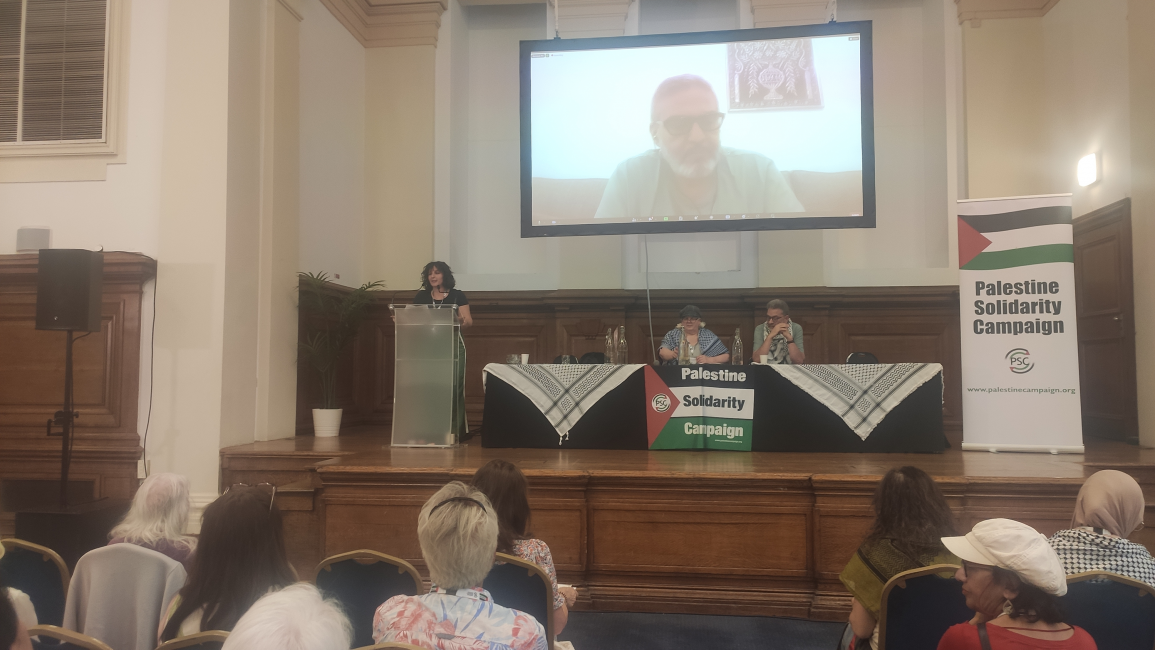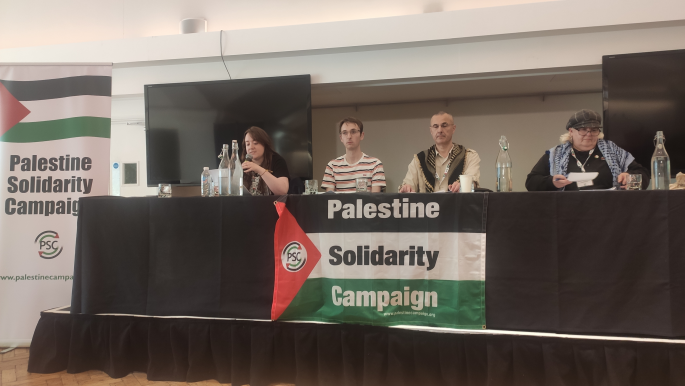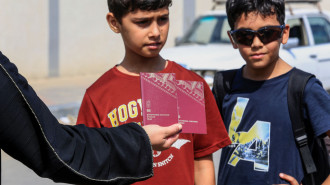UK: British-Palestinian doctor Ghassan Abu Sitta calls out 'axis of genocide' at BDS event
British-Palestinian doctor Ghassan Abu Sitta called out countries he said were part of an "axis of genocide" after a deadly Israeli attack on Gaza killed over 90 forcibly displaced Palestinians sheltering in a school.
Abu Sitta, also the rector of the University of Glasgow, was addressing the Divest for Palestine Conference, held in the UK, online from Lebanon on Saturday.
He described the Israeli attack as an "atrocity", adding: "Someone supplied the murderer with its weapons."
Countries including the UK, France, and Germany "constitute an axis of genocide that has allowed these weapons to reach Israel unabated", Abu Sitta said.
"Israel is incapable of mounting a genocidal project for over 10 months on its own," he said, adding that companies, banks, and universities were "perpetrators".
Organised by the Palestine Solidarity Campaign (PSC), 250 to 300 people attended Saturday's divestment conference in London.
The event featured panels on themes including local government pensions, the arms trade, and activism at universities.
Campuses, long hotbeds of support for Palestine, saw student protest encampments spring up earlier this year following the outbreak of Israel's war on Gaza on 7 October.
Divestment, or withdrawing from investments in Israel and companies viewed as implicated in Israeli abuses, is one of three related tactics grouped together under the umbrella of the Palestinian-led Boycott, Divestment, and Sanctions (BDS) movement.
BDS co-founder Omar Barghouti said Palestinians were "not begging the world for charity".
"We're calling for meaningful solidarity, but before both, we are demanding an end to complicity," he told conference attendees.
"The most profound ethical obligation in situations of oppression is to do no harm and to repair harm done by you or in your name."
'Achieve change'
Hundreds of thousands of people have joined a series of major marches through London since Israel's war on Gaza began.
The demonstrations have been organised by a coalition of groups including PSC, the Muslim Association of Britain, and the Campaign for Nuclear Disarmament.
PSC director Ben Jamal told The New Arab his organisation thinks this is a moment to "take the energy from the street and build it into sustained campaigns that can achieve change".
He said the reason for the conference focusing on divestment was first because of a "significant victory" achieved when a proposed law known as the anti-boycott bill was "defeated" in May.
The bill would have prevented public bodies like local councils from implementing their own economic boycotts of foreign countries and was aimed particularly at thwarting the BDS movement.
It was introduced by the former Conservative government but failed to pass through the full legislative process before parliament was dissolved ahead of elections.
The second reason for Saturday's event focusing on divestment was "the extraordinary energy that's come into the movement of solidarity in the last 10 months", Jamal said.
"The mobilisations have been unprecedented," he added.
"What we're picking up is people saying, 'What else can I do? What do I need to focus on?'"
"We've seen this growth in the call for divestment."
Jamal said public bodies were a "key arena'" for action regarding their pension fund investments and the way they procure, or go about buying goods and services.
It comes after Waltham Forest Council in London announced on 22 July that it was "updating its ethical investment policy so that we can divest our pension funds from companies involved in the arms trade".
It followed pressure from Waltham Forest for a Free Palestine, and Jade Grogan, an organiser with the group, called the decision a "win" on Saturday.
On Friday, the BBC said it understood the council's decision would involve breaking off financial links with companies providing any country with arms, not limited to Israel.
Israel stands accused of genocide at the International Court of Justice and its war on Gaza has so far killed at least 39,790 people, according to the Palestinian enclave's health ministry.
'Top of the agenda'
The weapons trade has been a major issue since the Gaza war began and activists are calling on the British government to implement a two-way arms embargo on Israel.
Following recent reports the UK had stopped authorising new arms export licences to Israel, a spokesperson for the Department for Business and Trade said there had been "no change to our approach".
Exports are being reviewed after the Labour Party formed Britain's new government in July.
"This is actually still right on top of the agenda and the government know that they have to do something," Campaign Against the Arms Trade advocacy manager Katie Fallon told a panel session on Saturday.
"What we need to make sure is that what they do is actually meaningful."





 Follow the Middle East's top stories in English at The New Arab on Google News
Follow the Middle East's top stories in English at The New Arab on Google News


![The US vetoed a UN Security Council (UNSC) resolution demanding a ceasefire in Gaza [Getty]](/sites/default/files/styles/image_330x185/public/2185152251.jpeg?h=7ef8ac04&itok=RpLSj2pu)